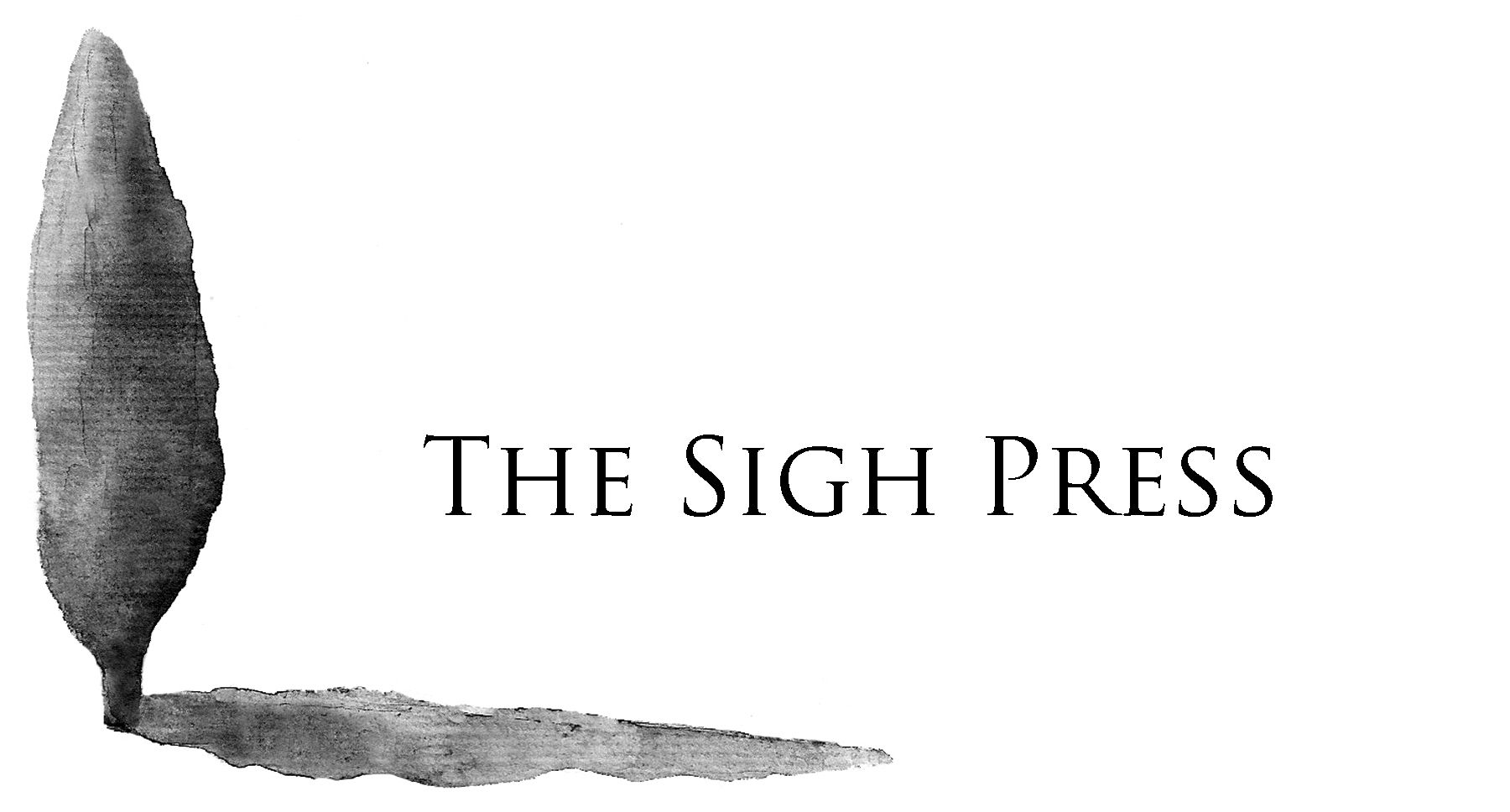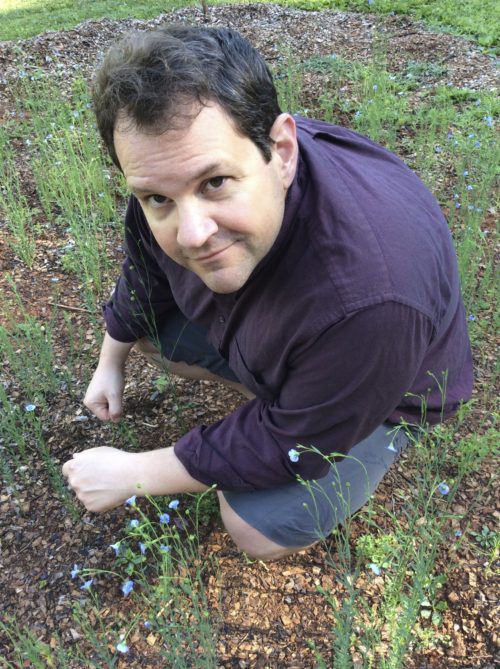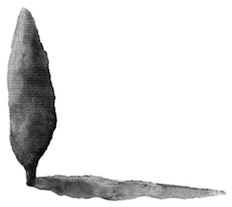Welcome to another interview in the Ampersand series: interviews with writers from all over the world who have a connection to Tuscany.

Ampersand 4
We are pleased to announce our fourth Ampersand Interview with poet Kevin McFadden, a true wizard of wordsmithery. We first met Kevin over a drawer of type at the Virginia Arts of the Book Center and later discovered…he’s part Tuscan! His latest book, in fact, is steeped in time he spent in Florence. We know you’ll enjoy hearing from Kevin about life and writing as much as we did.
Lyall Harris & Mundy Walsh, Editors

Kevin McFadden is the author of Hardscrabble and has recently published an illustrated cycle of poems, City of Dante, with artist Jeff Pike. Winner of the George Garrett Award for poetry from the Fellowship of Southern Writers and a New Writers Award from the Great Lakes Colleges Association, his poems appear in journals including American Letters & Commentary, Fence, Kenyon Review, Ploughshares, and Poetry. A letterpress printer, he’s currently at work on Speaking in Faces, a collaborative specimen book/artist’s book documenting the largest publicly accessible collection of moveable type in Virginia.
What book (not written by you) comes closest to capturing something about you? What is this aspect?
I was transformed by The Language Instinct by Steven Pinker. While the main idea is Noam Chomsky’s, Pinker helps bring a wider audience along with clarity and humor and connection to other disciplines. The main idea that language is a deep structure in us shaped as an adaptation, that if we were suddenly robbed of it, we’d invent it again and again. That language operates like an organ or appendage as necessary as any we can think of—the equivalent of an anteater’s tongue or a pelican’s beak. He explains that all the rules and conventions of language are teaching systems by which we shape this instinct—but that its power is something greater than the sum of those conventions. It is a power of invention and survival.
There are camps of linguists who set up camp in me. My inner descriptivist—someone who seeks to spot what’s there or apply rules to humorous ends—is often at odds with the prescriptivist thinking about strict applications or purity laws. It’s a necessary tension. We would be lost without convention…but not because any way is intrinsically right. No syntax system or dialect is divinely inspired. People just agree that having the same set of conventions is useful. But once you have those rules and boundaries, there is nothing more mischievous than to play that sideline.
What is the biggest personal obstacle you have to overcome in order to write?
It is mundane, but true: time. I suffer from interest in more projects than my working life will allow. I leave myself trails—maybe even a one- word trail—that I hope one day to pick up; but the difficulty is finding a stretch of time to get back to the trail. A day is the smallest unit of writing my particular faculties would allow. A contemplative day! The elusive luxury between a pair of tooth-brushings.
The density of your poetry is often buoyed by humor. The humor is usually an inside job, on the inside of language. Can you tell us a little bit about this?
Blake said a tear is an intellectual thing—so is a laugh. A laugh when I’m writing means I’m engaged; a laugh in the audience means they’re listening with me. And because humor can come from so many places— funny sounds, quick jarring combinations, an intellectual loop, the ineffable suddenly effed—I like to keep them around.
In “It’s Tarmac” from your book Hardscrabble, you say, “I’m interested in how thoughts cluster around a word.” Do you remember when (and under what circumstances) you discovered your particular brand of curiosity about language?
I did have a miracle early in my life with entire years dedicated to the study and pursuit of writing, amid only marginal erstwhile commitments. I could let a word like “tarmac” open up—its history, its congregation of personalities who lived and died in the pursuit of roads, the sheer ubiquity of the many surfaces on which our lives are lived at increasing velocity.
On or around the year 2000, when “It’s Tarmac” was written, that was my word.
And when you open a word up like that—it can take a while to close! A word with something to unload is usually the inspiration point to me to a poem. A few phrases bring it along, then a few others, then a lot of sticking material to pull those parts together. The sticking material can come from anywhere. I like to pull it from anywhere that will give it. The working of that material into something strange yet clear is usually where we succeed or fail as poets. Even the most pedestrian phrases, properly attended, spring out to life again.
It has been said that artists pursue one question in different ways throughout their work. Would you say this is true of your writing? If so, what is your question?
I like those questions that you can’t quite tell from exclamations. The stuff of interrobangs. They don’t require an answer but one is usually implied. One is more and more handy by the day: Can you believe this?
What is something that few people know about you?
Probably that my mother is an immigrant. She seems so assimilated; she arrived at age nine. Immigrant lives, especially those escaping the ravages of war, mean a lot to me. Because you can see it proved out time and again that most people caught in the cross-hairs of history want nothing to do with the rigidities of ideology and conflict. They want a chance to live their lives. We have to listen to their experiences; we have to stay open to what an outsider might be able to tell us, even about ourselves. I am having to hearten myself with the clear-seeing eye of our foremost foreigner, Alexis de Tocqueville: “The greatness of America lies not in being more enlightened than any other nation, but rather in her ability to repair her faults.” Today, we are amply in need of repair. When you are in despair at the news, read some Tocqueville. Then act.
Tell us something that recently struck your funny bone or share your favorite joke.
Doctorates not Spin-Doctor-Its.
If you could shout something from a mountaintop, what would it be?
Motto in a pun! (An alter echo of mountain top.)
If you’d like to read the original pdf of this interview or read previous interviews, please go to the Ampersand page.

© 2017 THE SIGH PRESS
None of the work published by The Sigh Press may be copied
for purposes other than reviews without the author and artist’s written permission.